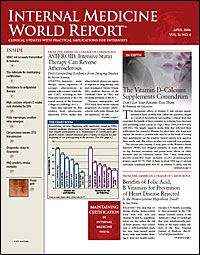Publication
Article
Prescribe Therapy Before Allergy Season Arrives
Author(s):
Inhaled Steroid May Improve Asthma Control in Obese Patients
MIAMI—As the period of hay fever approaches, physicians are urged to advise their patients who suffer from seasonal allergic rhinitis or conjunctivitis symptoms to take their medications in advance of the allergy season, said allergy expert Gillian Shepherd, MD, of Weill Medical College of Cornell University, New York City, at the recent American Academy of Allergy, Asthma & Immu?nology annual meeting.
Patients often postpone taking their medications until they are having symptoms. If they take a more proactive approach, however, and begin therapy 1 week before their symptoms normally start, outcomes will be greatly improved, Dr Shepherd suggests.
“Most patients don’t realize that antihistamines only work preventively. They go in the body and bind to a histamine receptor and block the allergic reaction from happening. Giving antihistamines after a person has had an allergic reaction, which is commonly done, doesn’t do very much,” she said.
Dr Shepherd told IMWR that there are now better tools for managing patients with seasonal allergic rhinitis, and the vast majority of them do not need to be referred to an allergist/immunologist.
She discussed 2 recent studies that showed that over-the-counter (OTC) nonsedating antihistamines may be as effective as prescription medications and that the benefits derived from inhaled steroids may decline with increasing body mass index (BMI).
In a study published in Archives of Otolaryngology—Head & Neck Surgery (2006;132:164-172), no real differences were found between the OTC decongestant pseudoephedrine (Sudafed 24 h) and montelukast (Singular) in relieving symptoms associated with allergic rhinitis and improving quality of life.
Both treatments reduced symptoms of allergic rhinitis and enhanced quality of life. But pseudoephedrine was more effective at alleviating the symptoms of nasal congestion. Neither medication caused significant side effects in this study.
“These drugs work in different ways....Montelukast functions to prevent allergic reactions, whereas pseudo?ephe?d?rine decreases nasal congestion after the allergic reaction occurs,” said Dr Shepherd. Thus, individualizing therapy is the best approach.
Montelukast, a beclomethasone in?haled steroid usually taken once daily, is a leukotriene antagonist. A new study published in the European Respiratory Journal (2006;27:495-503) found that asthmatic patients respond differently to montelukast based on their BMI. This study analyzed data from 4 previous multicenter, randomized, clinical trials involving 3073 patients with moderate asthma. The patients were categorized as normal weight, overweight, or obese.
In general, asthma severity was found to be greater among those who were overweight or obese. The inhaled steroid was better than placebo in increasing the number of asthma control days—defined as a day with <2 puffs on an inhaler, no nighttime awakenings, and no asthma attacks—among normal-weight individuals. Also, the inhaled steroid increased the number of asthma control days in obese patients, but not by as much as in normal-weight patients.
“It is increasingly recognized that obese people are more prone to develop asthma, but there is no information about whether obesity influences people’s responses to particular asthma medications,” said lead investigator Marc Peters-Golden, MD, of the University of Michigan Medical School, Ann Arbor. “Our findings are the first to suggest the possibility that obesity might be a factor that influences how well asthmatics respond to particular medications.”






